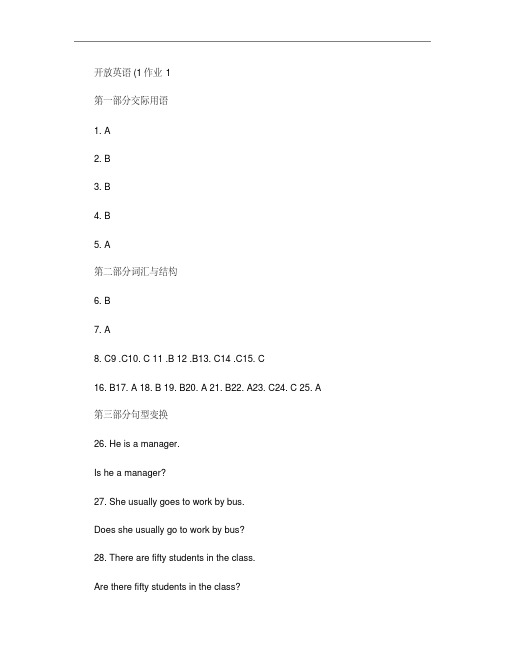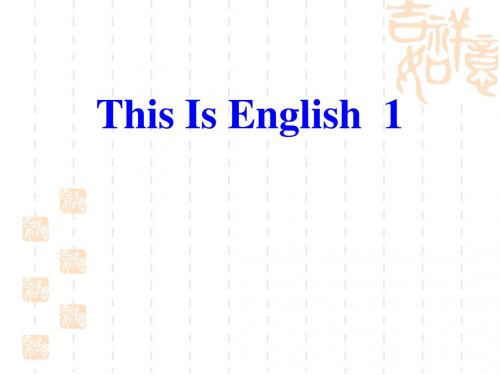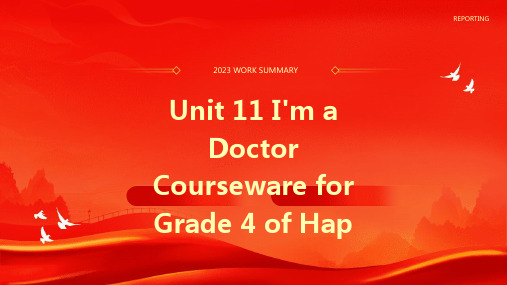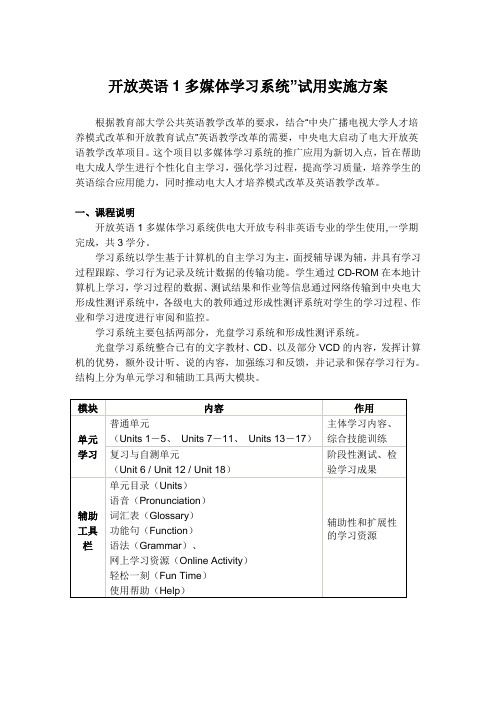Unit11开放英语I
2011春电大《开放英语1形成性考核册》作业答案

开放英语(1作业1第一部分交际用语1. A2. B3. B4. B5. A第二部分词汇与结构6. B7. A8. C9 .C10. C 11 .B 12 .B13. C14 .C15. C16. B17. A 18. B 19. B20. A 21. B22. A23. C24. C 25. A 第三部分句型变换26. He is a manager.Is he a manager?27. She usually goes to work by bus.Does she usually go to work by bus?28. There are fifty students in the class.Are there fifty students in the class?29. They have a large house.Have they a large house? / Do you have a large house?30. He’s currently working on TV advertisements.Is he currently working on TV advertisements?第四部分阅读理解31.B32.A33.A34.B 35.B 36.B 37.B 38.B 39.A 40.C第五部分翻译41--45题:将下列英文句子翻译成中文。
41. The Meeting Rooms are on the ground floor.会议室在一楼。
42. He ’s talking to a customer right now.他此刻正在和一顾客讲话。
43. David usually have a sandwich in his office at lunchtime.大卫午餐时间经常在办公室吃三明治。
44. I have a reservation for a single room.我预定了一间单人间。
开放英语1 Unit9-10 11.15(第六次课)

肯定式:主语+ can +v+…
否定式:主语+can't ( can not) + v+…
疑问式: Can +主语+v+…?
e.g. You cannot/ can’t go out to play now. 你不允许现在出去玩. 练习题:P87 Activity 2、3 ;P88 Activity 5、6
广州市广播电视大学蓝星分校
ቤተ መጻሕፍቲ ባይዱ
3. 留口信: e.g. Any message for him? 有口信给他吗? Can I take a message? 要留个口信吗? May I take a message? 留个口信好吗? Would you like to leave a message? 您想留个口信吗? Do you want to leave a message? 您想留个口信吗? I’ll call him back. 我会再打电话给他的。
广州市广播电视大学蓝星分校
表示允许与不允许(P86)
情态动词 can用来表示“允许”与may同义,它与别的情态动词 一样,不能单独作谓语,必须与一个动词一起来作谓语。不随 人称变化。构成疑问时,只需将can 提到句首。它的否定可以 是can’t 也可以是cannot 。 e.g. You can smoke in the garden. You can't smoke in the kitchen. Can I use the cooker in the kitchen?
/iə/ /eə/ /ʊə/
集中 双元音
广州市广播电视大学蓝星分校
辅音(28个)
轻辅音 /p/ 浊辅音 /b/ 轻辅音 /ts/ 浊辅音 /dz/ 鼻音 /m/ / t/ /d/ /ʃ/ /ʒ/ /n/ /j/ / k/ /g/ /tʃ/ /dʒ/ /ŋ/ 边音 /ǀ/ /f/ /v/ /tr/ /dr/ /s/ /z/ / h/ /r/ /θ/ /ð /
开放英语1Unit7-Unit11

开放英语1Unit7-Unit11Unit 7 Making Appointment一、表达提议;二、表达批评;三、打电话用语一、1.表达提议:结构Would you like to+动词原形1).---Would you like to come to dinner tonight?---Yes , I would , thanks./I’d love to (No, ,I wouldn’t, thanks.)2).---What would you like ?----An orange juice, please.3).---Would you like to stay the night?--- I’d love to .4).The shower isn’t working ?------I’ll call the plumber.2.提供建议:结构:What about…? How about…? Why don’t you …?注意:about 是介词后加V-ing的形式。
1)--How about seeing a film this evening?---That’s a good idea.2)--How about 6 O’clock ? ---Yes, 6 O’clock is fine (OK).3)---What about taking a taxi?---That’s a good idea.4)---Why don’t we write the invitation now?---That’s a good idea.2、建议约会:1)建议日期---Are you free on Wednesday?---Yes,We dnesday is fine.(No, I’m afraid I’m not free.)---What about Friday?---Yes, That’s OK.(No, I’m sorry,I’m busy.)2)建议具体日期---How about 6 O’clock?---Yes, 6 O’clock is fine.(No, I’m afraid I’m not free.)--Is 6 O’clock OK?---Yes, That’s OK.(No, I’m sorry I’m busy)二、表达批评:句型:“too+形容词”或者“not +形容词+enough ”,这两种句式意义相近,意为“太……”,“不够……”。
开放英语 1 unit 11

Activity 7
1.borrow 2.lend 3.lend 4.borrowing 5.borrowing 6.lends 7.borrows 8.lend
Language Focus
Neither do I. / Neither am I. / Me Neither. 用于表示对他人的否定意见有同感,或自己的情 况与他人一样。 ● 若原句中用的是动词 to be,答句中也用动词 to be。例如: - I am (I'm) not going to the shops. 我不是要去商店。 - Neither am I. 我也不是。
谈论兴趣、爱好和擅长 我们学习过的谈论兴趣、爱好的动词有 to like, to love, to hate, to prefer, to enjoy 等,这些动词后面都 要跟一个名词、代词或是动词的 -ing 形式,作为动 词的宾语。这种可以直接带宾语的动词叫及物动词 (transitive verbs)。看看下面这些句子: I love London. I like the café s and the concerts in the parks. I enjoy the long summer evenings. I hate shopping and spending money! I like reading English newspapers. I prefer watching television. I love surfing the Internet for information.
Language Focus
一般现在时 在 Unit 1 和 Unit 2 里,我们学习过一般现在时表 示习惯性的行为或是说明现在的状态。
开心学英语四年级下册Unit11I’mator课件之

学生可以模拟扮演医生和护士,通过角色扮演的方式了解医疗团队的工作流程。在对话中,学生可以学习如何交接病人信息、安排手术时间、讨论治疗方案等,同时也可以学习如何用英语表达医疗术语和常用表达方式。
详细描述Biblioteka VS模拟医生与医生之间的对话,提高医学专业英语水平。
详细描述
学生可以模拟扮演两位医生之间的对话,通过角色扮演的方式提高自己的医学专业英语水平。在对话中,学生可以学习如何交流医学研究成果、讨论病例、分享诊疗经验等,同时也可以学习如何用英语表达医学术语和学术用语。
详细描述
PART
07
Writing training
描述理想职业
总结词
让学生们通过写作,描述自己理想的职业是什么,以及为什么选择这个职业。这有助于培养他们的想象力和目标设定能力。
详细描述
倡导健康生活方式
通过写作,让学生们了解健康生活方式的重要性,包括均衡饮食、适量运动、保持良好的作息时间等。这有助于培养他们的健康意识和自我管理能力。
PART
01
Course Introduction
Language skills development
Enable students to understand and use medical vocabulary and expressions through interactive and engaging activities.
疑问句是用来询问信息的句子,通常以疑问词开头,如“What”、“Where”、“When”等。
PART
04
Listening training
总结词
了解医生与病人之间的对话,提高听力理解能力。
详细描述
《开放英语1》考核方案(中央电大)

开放英语1多媒体学习系统”试用实施方案根据教育部大学公共英语教学改革的要求,结合“中央广播电视大学人才培养模式改革和开放教育试点”英语教学改革的需要,中央电大启动了电大开放英语教学改革项目。
这个项目以多媒体学习系统的推广应用为新切入点,旨在帮助电大成人学生进行个性化自主学习,强化学习过程,提高学习质量,培养学生的英语综合应用能力,同时推动电大人才培养模式改革及英语教学改革。
一、课程说明开放英语1多媒体学习系统供电大开放专科非英语专业的学生使用,一学期完成,共3学分。
学习系统以学生基于计算机的自主学习为主,面授辅导课为辅,并具有学习过程跟踪、学习行为记录及统计数据的传输功能。
学生通过CD-ROM在本地计算机上学习,学习过程的数据、测试结果和作业等信息通过网络传输到中央电大形成性测评系统中,各级电大的教师通过形成性测评系统对学生的学习过程、作业和学习进度进行审阅和监控。
学习系统主要包括两部分,光盘学习系统和形成性测评系统。
光盘学习系统整合已有的文字教材、CD、以及部分VCD的内容,发挥计算机的优势,额外设计听、说的内容,加强练习和反馈,并记录和保存学习行为。
结构上分为单元学习和辅助工具两大模块。
形成性测评系统通过中央电大考试平台实现如下功能:学生学习过程的监控、记录及成绩管理、统计等数据管理;教师远程评判主观性作业和扩展资源的上传下载等传输管理,以及有关教师和学生的信息数据查询等。
这套学习系统的运行环境要求如下:(1)硬件要求(最低配置):赛扬800MHz主频,128M内存,硬盘800M 以上可用空间,耳机(带MIC),鼠标,键盘。
(2)软件要求:Windows 2000以上操作系统,安装Windows Media Player 9.0以上版本。
二、课程考核本课程的考核由形成性考核和课程终结考试两部分组成,形成性考核占总成绩50%,课程终结考试占50%。
1.形成性考核满分100分,占课程总成绩的50%,由三部分构成:普通单元学习成绩、阶段性测试成绩以及学习表现分数。
电大开放英语1词汇表(unit1-5)
1.appropriate[ə'prəʊprɪət] adj. 合适的2.be available for sth 有空做某事3.be over the moon快活极了4.burst [bɜːst] vi. 爆发,突发;爆炸;(使)破裂5.burst in突然出现6.connection[kəˈnekʃn] n. 连接;关系;人脉7.consideration[kənsidə‘reiʃ(ə)n] n. 考虑;体谅8.counter['kaʊntə] n. 柜台9.current[‘kʌr(ə)nt] adj. 当前的;最近的10.edition[i'diʃ(ə)n] n. 版本11.enclose [in'kləʊz] vt. 围绕;装入;放入封套12.engineering[endʒi'niəriŋ] n. 工程,工程学13.enquire[in'kwaiə] vi. 询问;调查14.failure['feiljə] n. 失败15.final ['fain(ə)l] adj. 最终的;n. 决赛16.firm[fɜːm] n. 公司17.hobby['hɒbi] n. 嗜好18.industry [‘indəstri] n. 产业;工业19.influence (on) ['ɪnflʊəns]影响20.interest [‘int(ə)rist] n. 兴趣,利息21.journalism ['dʒɜːn(ə)liz(ə)m] n. 新闻业22.look back回顾23.manufacture[mænjʊ'fæktʃə] n. 制造24.particularly[pə'tikjʊləli] adv. 特别地,独特地25.period['piəriəd] n. 时期26.placement[‘pleismənt]安置,放置27.product['prɒdʌkt] n. 产品28.purchase['pɜ:tʃəs] n. 购买29.racket ['rækit] n. 球拍30.range[rein(d)ʒ] n. 范围;幅度31. a full range of 各类的32.regularly['rɛɡjəlɚli] adv. 定期地33.relevant[ˈreləvənt] adj. 相关的34.be relevant to与…….相关35.require[ri'kwaiə] vt. 需要;要求;命令36.risky ['riski] adj. 危险的;冒险的37.special ['speʃ(ə)l] adj. 特别的38.specialisation [,speʃəlai'zeiʃən] n. 专业化39.straightaway [,streitə'wei] adj. 通俗易懂的;立刻的40.success[sək'ses] n. 成功41.take on 聘用42.winner['winə] n. 胜利者ncaster 兰开斯特1.admire[əd‘maiə] vt. 钦佩;羡慕2.artistic [ɑː‘tistik] adj. 擅长艺术的3.authority [ɔː'θɒriti] n. 权威;当局4.be in love (with)爱恋着(某人);迷恋5.call in on (sb)拜访e along (with)跟着…….一起来7.cross[krɒs] adj. 生气的,恼火的;n. 叉号,十字架;vi. 交叉8.cruel[krʊəl] adj. 残酷的,残忍的9.demolish[di‘mɒliʃ] vt. 拆毁;摧10.diabetic[daiə‘betik] adj. 患糖尿病的;n. 糖尿病患者11.diagnose ['daiəgnəʊz] vt. 诊断12.fizzy drinks带气泡的饮料13.forever [fə'revə] adv. 永远14.funfair ['fʌnfɛr] n. 游乐场15.goat[gəʊt] n. 山羊16.good-natured [‘ɡudneitʃəd] adj. 性格温和的;和善的17.gossip[‘gɒsip] n. v.说闲话,流言蜚语18.grow up长大19.inner[inə] adj. 内部的20.look up to敬慕21.loyal ['lɒiəl] adj. 忠诚的22.market['mɑːkit] n. 市场23.marry['mæri] vt. 嫁;娶24.musical [‘mjuːzik(ə)l] adj. 擅长音乐的25.poke oneꞌs nose into sbꞌs business探听别人的事情26.pound [paʊnd] n. 英镑27.put up with 容忍;忍受28.sausage['sɒsidʒ] n. 香肠29.set[set]vt.n.放,设置,确定;(一)套30.set out (for)出发(去)31.sophisticated [sə‘fistikeitid] adj. 谈吐得体的;老练的;精密复杂的32.specialist ['speʃ(ə)list] n. 专家33.spend[spend] vt. 度过;花费34.take care of 照料35.take place发生36.tell off责备37.try out试验38.whatever[wɒt‘evə] adj. 无论怎样的39.wheel[wiːl] n. 轮子40.Cardiff ['kɑ:dif] n. 加的夫(英国港市)1.along with连同……..一起2.alternative[ɔːl‘tɜːnətiv] adj. 可供选择的方法;选择性的3.appearance [ə‘piər(ə)ns] n. 外表,外观;出现,出场4.bacon['beik(ə)n] n. 咸肉;熏肉5.(be) born to出生于6.proud (of)adj.骄傲的,自豪的,得意的7.care [keə] n. 操心;愿意;喜欢;关怀;照料8.care for照料9.carer['kɛrɚ] n. 照顾(老人,病人,小孩)的人10.crime[kraim] n. 罪行,犯罪11.date[deit] n. 日期;约会12.decline[di'klain] n. vi. 下降;衰落;谢绝13.divorce [di'vɔːs] vt. n.离婚14.European[jʊərə'piːən] adj. 欧洲的15.freedom ['friːdəm] n. 自由16.hairdresser['heədresə(r)] n. 美发师17.head[hed] n. v.头脑;领袖;出发18.imagine [i‘mædʒin] vt. 想像;设想19.keep in touch保持联系20.normally ['nɔːm(ə)li] adv. 通常地,一般地21.now and again不时地22.obviously[‘ɒbviəsli] adv. 明显地;显然地23.personal ['pɜːs(ə)n(ə)l] adj. 个人的24.proportion[prə'pɔːʃ(ə)n] n. 比例25.rather than不是……..而是………26.recent['riːs(ə)nt] adj. 最近的27.retire[ri‘taiə] vi. 退休;隐退28.retirement[ri'taiəm(ə)nt] n. 退休29.rob [rɒb] vt. 抢劫;抢掠30.sharp [ʃɑːp] adj. 明显的;锐利的;敏锐的;准时的31.significant[sig‘nifik(ə)nt] adj. 显著的;有意义的;重要的32.size[saiz] n. 大小;尺寸33.slight[slait] adj. 微小的,微不足道的34.society [sə‘saiəti] n. 社会;协会35.split [split] vt. 分开,分裂36.split up离婚;分开37.spontaneously[spɒn‘teɪniəsli] adv. 自发地;自然地;随心所欲地38.steady [‘stedi] adj. 平稳的;稳定的;使……稳定39.stressful ['stresfʊl] adj. 紧张的40.toast[təʊst] n. 吐司面包;烤面包41.trap [træp] vt. 使…受限制;n. 陷阱42.victim[‘viktim] n. 受害者;牺牲品1.amazing[ə'meiziŋ]adj.了不起的,令人惊奇的2.amuse [ə'mjuːz]vt. 给.......提供娱乐;逗乐3.bend[bend]n. 道路弯曲处;vi. 弯曲4.chance [tʃɑːns]n. 机会5.by chance偶然6.cancel['kæns(ə)l]vt. 终止;取消7.carry on继续8.casualty ['kæʒjʊəlti]n. 受伤者9.considerably [kən'sid(ə)rəbli]adv. 相当大地;在很大程度上10.crockery['krɒk(ə)ri]n. 陶器11.design[di'zain]vt. 设计12.double-glazing [,dʌbl'gleiziŋ]n. (门、窗的)双层玻璃13.drop sb off 使(某人)下车14.editor ['editə]n. 主编,编辑15.entire[in'taiə]adj. 全部的,整个的16.eventually [i'ventʃʊəli]adv. 最后17.export[ˈekspɔːt]n. 输出,出口18.fall [fɔːl]vi. 垮台;下降;降落;减弱n. 秋天19.follow ['fɒləʊ]vt. 跟随20.fresh[freʃ]adj. 新鲜的21.guidebook ['gaidbʊk]n. 旅游指南22.hand over移交23.harbour [ˈhɑ:bə(r)]n. 港湾(等于harbor)24.horrified['hɒrifaɪd]adj. 惊骇的;惊恐的25.keen [kiːn]adj. 热衷的26.lose one’s job失业27.normal['nɔːm(ə)l]adj. 正常的;正规的28.own[əʊn]vt. 拥有;adj. 自己的29.petrol['petr(ə)l]n. 汽油30.portuguese [ˌpɔːtjʊˈɡiːz]n. 葡萄牙人;葡萄牙语31.profit['prɒfit]n. 利润32.proper ['prɒpə]adj. 正经的;恰当的33.race [reis]n. vt. 快速行进;比赛;竞争34.reluctantly [ri'lʌktəntli]adv. 不情愿地;勉强地35.row[rəʊ]n. vt. 争吵36.sail[seil]vi. 航行;航海;帆37.sailing boat帆船38.shortly ['ʃɔːtli]adv. 不久;立即39.sightseeing['saitsiːiŋ]n. 观光40.sue[s(j)uː]vt. 起诉41.sunset['sʌnset]n. 日落42.to do sth till one drops做某事直到撑不住为止43.voluntarily['vɒl(ə)ntærɪlɪ]adv. 自愿地;自发地44.wildlife['waɪl(d)laɪf]n. 野生动植物45.Brazil[brə'zil]n. 巴西46.Rio (de Janeiro) [ri:əudə(d)ʒə'niərəu]n. 里约热内卢47.Portugal[ˈpɔːtjʊɡəl]n. 葡萄牙48.Moscow['mɔskəʊ]n. 莫斯科49.San Paulo[sau'pauləʊ]n.圣保罗Unit 51.as soon as possible尽快2.aware (of)[ə'weə]adj. 意识到的;知道的3.ballet['bælei]n. 芭蕾4.civil['siv(ə)l]adj. 公民的;平民的5.classical['klæsik(ə)l]adj. 古典的;经典的6.closely ['kləʊslɪ]adv. 紧密地;接近地7.counsellor ['kaʊns(ə)lə]n. 顾问;律师8.creativity[,kriːei'tiviti]n. 创造力;创造性9.deck[dek]n. 甲板10.dynamic[dai'næmik]adj. 生机勃勃的;充满活力的cation[edjʊ'keiʃ(ə)n]n. 教育12.energy ['enədʒi]n. 精力13.gender['dʒendə]n. 性别14.helicopter ['helikɒptə]n. 直升飞机15.in one’s opinion 某人认为16.injure['indʒə]vt. 伤害,损害17.intelligence [in'telidʒ(ə)ns]n. 智力;情报18.intuition[ɪntjʊ'iʃ(ə)n]n. 直觉19.involve [ɪn'vɒlv]vt. 涉及;使卷入;使介入20.logical ['lɒdʒik(ə)l]adj. 逻辑的21.marketing['mɑːkitɪŋ]n. 销售业务22.patient ['peiʃ(ə)nt]adj. 有耐心的;n.病人23.positive ['pɒzitiv]adj. 积极的;确信的,肯定的24.process ['prəʊses]n. 程序25.psychiatrist [sai'kaiətrist]n. 精神科医生26.raise [reiz]vt. 筹集;举起27.rough[rʌf]adj. (海面)不平静的;粗糙的28.section['sekʃ(ə)n]n. 部分29.simply ['simpli]adv. 只不过;仅仅30.support [sə'pɔːt]vt. n.支持,支撑,赞助31.wave[weiv]n. 波涛。
朱明zhubob开放英语11(1)
ENGLISHA81.He looks shy…2.They look naughty3.It looks safeA11-P99Suggest + doing sth.Suggest + that –John suggested that they (should) set up a residents’ committee. Actt.14 p.1191.about2.about3.about4.by /at5.for6.by7.about8.by9.for /about10.withU8A1Spend + time/money + (in) doing sth.Spend + time/money + on sth.Be used to doing sth.Get used to doing sth.A2---P1111.A large proportion /The majority of households have amicrowave oven.2.More than half of managers have a dishwasher.3.Just under a quarter of unskilled workers’ households have adishwasher.P116-A11U9A1—P1241. F. The ancient Olympic Games began in the year 776BC.2. T.3. F. The last games were held in AD393--- a period of 617years.4. T.5. F. Marathon is where the Persians were defeated by asmall Greek army.6. T.7. F. The first torch relay in the modern Olympic Games was staged in Berlin in 1936.8. F. The marathon is a modern event that was first introduced in the Olympic Games in 1896.A4-P1271)were always held2)are held3)is awarded4)is chosen5)is supported6)is allowed7)is considered8)is selected9)are heldA5Part A1. b2. e3.g4. f5. a6.h7.i8. c9. d单音节跟部分双音节词1.+er +est: fairer- fairest2.e+r e+st: white – whiter- whitest3.辅音字母+y结尾,改y为i,+er/est : early-earlier-earliest4.重读闭音节结尾,双写最后字母+er/ est: hot-hotter- hottest 部分双音节词跟多音节词More+ ; most + …Good- better- best bad- worse- worstMany/ much – more- mostA is + adj.比较级+ than B.Tom is taller than Mark.A + V. + adv. 比较级+ thanB + (V).Tom runs faster than Mark does.A is + the + adj.最高级+ 范围(in / of / 定语从句).Actt.7 用形容词比较级/最高级填空p.1291. the highest2. the fastest3. faster4. betterActt.13 用动名词改写句子p.134Part A1. Preparing for the Olympic Games costs a lot of money.2. Hosting the Olympics is very prestigious.Part B1. Before making a bid, the city did a lot of research.2. After hearing the result, the people were very excited.主将从现A15-P136用真实条件句造句, 谈论举办奥运会的利弊1. If we host the Olympic Games, the government will spend a lot of public money.2. The government won’t have enough money for schools and hospitals if it spends a lot of money on the Olympic Games.3. If tourists come to the Olympics, they will spend a lot of money in the country.U10A3—P142Activity 31. Men who smoke are more likely to die if they don’t do exercise./Men who smoke are less likely to die if they do exercise2. The study was of 6000 middle-aged men.3. Dr Ken cooper agrees with the study.4. A previous study found different results.5. The British Government is putting pressure on manufacturers to reduce levels of sugar in food.Activity 4---P143<1> Join <2>Be <3> Go <4> take<5> take <6> Continue <7>Stick to <8>addActivity 11---P1471. (b) put on; weight2.(c) I’m on a diet3. (e) lose weight4.(f) keep weight off5. (a) weight goes up; (g) weight goes down6. (d) go on a diet\A12Activity 12Part A1.75 kilos;2.75 kilos3.58 kilos4.58 kilosPart B5.a sandwich6.never7.a couple of glasses of wine8.at the weekendActivity 14---P1491.If you ate immediately after the session, you wouldn’t feel sick.2.If you wore long trousers after exercise, you wouldn’t get soremuscles.3.If you ate one hour before a session, you wouldn’t get sohungry.U11Actt. 11 p.1631.a. sleepb. concentratec. eatd. sicke. tired2.The following statements are correctc. DVT can be painful and is dangerous.d. Swollen legs and ankles are painful but not dangerous.f. DVT can happen to anyone sitting incramped conditions for a long time.Actt.15 直接引语→间接引语p.1661.He told me(that)he was going to the USand he couldn’t find his passport.2.She said that she had left her mobilephone at the check-in desk in London and she wanted to notify them as soon aspossible.3.They said they were worried because theirdaughter suffered from asthma. Shehadn’t taken her medicine before theflight.4.He told me he hadn’t slept well before theflight and he couldn’t sleep now. Heneeded a sleeping pill.Actt.14 间接引语→直接引语p.165a.“I want to lie down. My head aches and Ifeel sick.”b.“I am pregnant. The lunch was badlycooked, so I didn’t eat it. I want to eat some fruit.”2.U12A2-P1721-5 ACBAC6-10 ABBCB11-15 CACBAA31-5 CACBC6-10 ABCBBA5-P1741-5 ACEDBA61-5 BACABA71…. he exercised every day, but when he had been younger he hadn’t.2. …exercised every day, they will live longer.3. …is being repaired by the builder.Unit 13He said: “I must finish my homework.”He said that he had to finish his homework. Activity 1---p1781.They (have to) start (school) at the age of five.2.They go to a nursery school.3.No. They (have to) follow the National Curriculum.4.They study a range of basic subjects such a reading, Writing and mathematics.5.No. Some children go to private schools.6.They usually begin/start secondary school at 11.7.They take the GCSE(General Certificate of Secondary Education).8.They can leave school at 16.9.They can stay at school, go to a further education college or go to work.10.Because they want to lean English and because they believe/think that they will benefit from the ideas in Western universities.Activity 5---P1811.d id you have to2.h ad to3.h ad to4.d id they have to5.h ad to6.h ad to7.m ustn’t8.m ust/have to9.m ustn’tActivity 81.if I do more work2.I’ll get3.I’ll be able to4.if I worked5.I wouldn’t get6.will you do when you leave7.when I finish8.I’ll wait for9.I’ll decide10.If I pass11.I’ll go12.if I have to13.I’ll do14.I’ll goActivity 15—P1891.sitting down2.to leave3.to register4.visiting5.studying6.to check7.to close8.drivingActivity 121.By the end of July the building committeewill have approved the plans.OR The building committee will haveapproved the plans by the end of July. 2.By the end of July the finance committeewill have approved the budget.OR The finance committee will have approved the budget by the end of July.3.The new Director will not have/won’thave started his job by the end of July.U15A1-P201A.1B.2C.6D.10E.7F.12G.14H.15I.16J.17A3-P214…Actt.7 现在进行时的主动/被动语态p.2151.is being done2.are being delivered3.are moving4.is being driven5.is john doing6.is waiting7.are being built8.are being sent9.are we doing10.a re being drawnActt.8 一般现在时/现在进行时主/被动语态p.2161.need2.are doing3.are being planted4.is being done5.are planting6.are being painted7.think8.am workingActt.16 现在进行时/现在完成时的被动语态p.2221.we are being followed2.have you been watching3.I have been driving slowly4.I have been waiting for him5.we have been seen6.he has been acting7.has been closed8.People have been attacked9.What have you been reading10.have been hijacked11.Are we still being followedActt.5---P2321.Unemployment can be caused by pooreducation.2.Crime can lead to family Break-up.3.Unemployment can cause unhappiness.4.Crime can occur because of pooreducation.5.Unemployment can be due to poorhealth.U17Activity 2---P2461.B ecause the wrier thinks that London is a world, not just a nation.2.I t is the world’s most culturally diverse city.3.T he writer thinks they are an advantage because they have added to its characterand prosperity.4.T hey will make up 40% of the population.5.T hey live in London.6.83% of the total African population of Britain live in London.7.T hey have come from North Africa, Kurdistan and Eastern Europe.8.Y oung people are adapting best.Activity 5---P2481.Not many of / Most of2.Some of /Many of3.Almost all /a few of4.Several of / Not many of5.Hardly any of /Several of6.None of /Some of7.Several of /Nearly all8.Only a few /Several9.Most of /Very few ofActivity 9—P2511.She asked me if I was Arabian.2.She asked me why I had come/came to England.P255—A14Activity 141. You shake hands and say,” how do you do?”2. You don’t shake hands. You just say “Hello”.3. You should take a present-a bottle of wine or some chocolates or flowers.4. It is not all right unless you know the host well.5. Yes, you should do so.6. No, they don’t. You should avoid (talking about) religion, politics and money.7. Good topics are weather, holidays, Weekend activities, gardens and architecture, especially houses and homes.8. You take turns to buy a drink for everyone in you group and pay for the drinks before you drink them.A17-P257 Activity 171.don’t you?2.do they?3.doesn’t it ?4.won’t you?5.isn’t it?6.aren’t they?7.hasn’t he ?8.hasn’t he?A18—P2581.isn’t she2.aren’t you3.haven’t I4.haven’t they5.have they6.aren’t IU18A2---P2621-5 CBAAC 6-10 ACBCA 11-15 BCABAA31-5 BACBA 6-10 CBACBA41.B2.E3.D4.A5.CA51.R2.R3.W4.D K5.W A61-5 CBBCA。
九年级人教版英语u11知识点
九年级人教版英语u11知识点(unit 11 knowledge point can be introduced in an engaging manner without using section titles.)In the 9th grade textbook of People's Education Press, Unit 11 delves into various important aspects of the English language. This unit covers a wide range of knowledge points, including discussing future plans, giving advice, expressing preferences, and making decisions. Let's explore some of these key concepts below.One significant topic covered in this unit is discussing future plans. In everyday life, it is common for people to talk about their ambitions and aspirations. Students learn how to express their dreams and goals in English, using phrases such as "I hope to," "I plan to," and "I want to." By understanding these expressions, students can communicate their aspirations confidently.Another crucial aspect of Unit 11 is giving advice. Sometimes, we face situations where we need guidance or help. It is important to know how to seek advice and express our suggestions in such circumstances. The textbook provides examples like "If I were you," "You should," and "I suggest," enabling students to give advice effectively in English.Furthermore, expressing preferences is an essential skill in language learning. Being able to convey personal likes and dislikes helps in making choices and maintaining conversations. Unit 11 offers vocabulary and sentence structures that enable students to clearly express their preferences. Utilizing phrases like "I prefer," "I'd rather," and "I'm into" empowers students to communicate their opinions and engage in meaningful discussions.In addition to expressing preferences, making decisions is another focal point in this unit. Decision-making plays a crucial role in our lives, and being able to communicate our choices effectively is key. Unit 11 equips students with the necessary language skills to express decisions clearly. Through phrases like "I have decided," "I have made up my mind," and "I choose to," students can confidently share their decisions in English.Moreover, Unit 11 introduces the concept of expressing regret and disappointment. Life is full of ups and downs, and there are times when we encounter disappointments or have regrets. It is important to express these emotions appropriately in English. The textbook provides students with phrases such as "I'm sorry," "I regret," and "I wish I had," allowing students to express their feelings effectively and with empathy.Unit 11 presents a comprehensive exploration of various knowledge points in the English language, providing students with the necessary tools to communicate effectively. By thoroughly understanding and practicing the concepts presented in this unit, students can enhance their language skills and confidently engage in conversations.In conclusion, Unit 11 of the 9th-grade textbook of People's Education Press covers a wide range of knowledge points in an engaging manner. From discussing future plans to giving advice, expressing preferences, making decisions, and conveying regret and disappointment, this unit equips students with crucial language skills. By mastering these concepts, students can communicate effectively and confidently in English, enhancing their overall language proficiency.。
2012年(秋)电大行政管理《开放英语(1)形成性考核册》参考答案
开放英语(1)形成性考核册答案学前记录卡请自我评估一下你目前的英语基础.1.你是否掌握了本课程作为起点要求的600基础词汇: A. 是. B. 否√2.你现有的词汇量约为__500___ ,能熟练使用的词汇约为__300__.3.请写出你认为自己已经掌握的英语语法内容.人称代词、冠词、一般现在时、词类、there be的句型等的用法。
下面提供一些英语学习的方法,供你参考。
但请注意,语言的运用是一种技能,这种技能不是专靠技巧能够获得的,必须要对学习的内容本身投入较多的时间和精力。
只有通过大量而反复的练习,才能真正做到熟能生巧。
1、把英语当成获取信息、交流的工具,让英语派上用场,也让自己从学习中找到乐趣.2、每周制订一份切实可行的学习计划,帮助自己安排学习时间,完成学习任务.3、我每天都会抽出一些时间学习英语,不间断地进行听说读写的练习。
4、记忆单词时不是孤立地死记硬背,而是通过例句来记住它的含义\搭配,并试着用它造句来加深理解和记忆。
5、学习新单词时注意它的词性及其变化形式。
例如,名词要区分是可数还是不可数,如果是可数名词,还要了解它的复数形式;动词要分清是及物,还是不及物,以及它的各种变化形式(单数第三人称的变化形式;ing形式等等)。
6、在学习新的语法知识时注意把新知识与已经掌握的联系起来,并进行归纳总结,加深理解。
7、选择自己感兴趣的内容进行阅读,如小说、幽默故事等,以保证有足够的动力坚持下去。
8、看到好的的句子就把它摘抄下来,反复诵读。
9、先跟读音内容,尽量模仿其语音语调,然后再不跟录音自己大声朗读。
将自己的朗读录下来与原录音内容进行比较,找出差距。
10选择一些难度适当的听力材料反复听然后进行听力练习,争取做到一字不漏。
11、营造听力的语言环境,如听英语广播、看英语电视节目,坚持每天都有语音输入,锻炼自己的听力。
12、学完一篇课文后,将其译为汉语,然后不看原文再将汉语译文口译回英文,这样既作了复述练习,又作了口语练习,同时还发掘出一些学习课文时容易忽略的地道的英语用法。
- 1、下载文档前请自行甄别文档内容的完整性,平台不提供额外的编辑、内容补充、找答案等附加服务。
- 2、"仅部分预览"的文档,不可在线预览部分如存在完整性等问题,可反馈申请退款(可完整预览的文档不适用该条件!)。
- 3、如文档侵犯您的权益,请联系客服反馈,我们会尽快为您处理(人工客服工作时间:9:00-18:30)。
Borrow & lend
Oh, can I borrow it? Of course, I’ll lend it to you.
Borrow意思是“借走,借来,向别人借”;lend 意思是“借给,借出去” e.g. He borrows a lot of money from me.
They sometimes lend their car to their parents.
对话中的句子: What do you think of living in London? Do you think China is changing a lot? 询问他人意见时,可以用下面句型结构: to think of …(+n. / v-ing形式) to think (that)…(+句子) “你认为…怎么样?” e.g. what do you think of the movie? What does your girlfriend think of her boss? Do you think that Farewell Atlantis will happen in the end of 2012.
I love London. I like the cafes and the concerts in the parks. I hate shopping and spending money! I love sitting in cafés and reading newspapers. I like reading English newspapers. I prefer watching television. I love surfing the Internet for information. 1.这些句子中所有的动词后都跟一个名词、代词或是动 词的-ing形式,它们是动词的宾语。像to like, to love, to hate, to prefer后面也可以跟动词不定式(to do)。 但是,to enjoy后面只能是名词或动词的-ing形式。 e.g. I enjoy the long summer evenings.
He is good at running this machine.
Our students are keen on learning English.
1. 表示顺序的副词 First(首先), next(其次), after that(之后), then(然后), 和finally(最后)这些词常用来表示顺序。First与 finally的意思很明确,一头一尾,位置不能变。而 next, after that, then意思相仿,位置可以互换。 2.表达指示或命令。 表达指示或命令一般有两种句型:一种是祈使句, 即用动词原形开头的句子;另一种用第二人称的一 般现在时。 祈使句: First, close the door, then, press the start button. 第二人称一般现在时:Then, you close the door, after that you press the start button.
This Is English Unit 11 How Are You Settling In?
Why & because
询问原因的问句以why开头,答句以because开头。 e.g. Why do you go to there? Because I want to get my book. ? 1._______ Why do you like London__ 2._______ Because I want to buy a T-shirt__ . ? Becausethe weather here is often depressing_ 3.______ ? 4._______ Why do you want to go back to Italy__ 5._______ ? Why are you going to the shops__ Because the parks are lovely__ . 6._______
How 的使用
疑问句how用以表示in what way(怎么,如何)。 e.g. How do I get to your houses? How do you go to work? 如果与show, know等动词连用,how之后要用动 词不定式to get, to use等。 e.g. Can you show me how to get to your house? I don’t know how to use the washing machine?
询问他人的意见
提出自己的意见
I sometimes think that it’s too big and busy. I think it’s very different from the West. 提出自己意见时,用:
to + think (that) …+(句子)
e.g. I think (that) she should apologize for her mis-action.
Match the following words with the Chinese translation
1. A film 2. A drama 3. A quiz show 4. A documentary 5. The news 6. A comedy 7. A soap opera 8. A cartoon 9. A tragedy 10.Science fiction 电影 戏剧 智力游戏节目 纪录片 新闻 喜剧 肥皂剧 动画片 悲剧 科幻片
谈论兴趣、爱好和擅长
2. to be interested in(对…感兴趣), to be good at(
擅长…善于…), 和to be keen to(渴望做…热衷于
…)后面都跟名词、代词或是动词的-ing形式。
e.g. I’m interested in playing basketball.
1. 2. 3. 4. 5.
6. 7. 8.
Mickey Mouse and Donald Duck are _____. cartoons film at the cinema. You usually see ______ shows In quiz _______ people answer questions and win prizes. Soap operas are stories about ordinary people. ___________ You can see them several times a week. In ________ the news you hear and see pictures of real things today in the world. In ____________ documentaries you learn a lot about something which is usually interesting and serious. dramas at the theatre and also on TV. You can see ________ comedy programme makes you laugh. A ________
谈论电视节目
be on的意思是电影或电视节目“上演,上 映”。 e.g. What’s on? Australian Nature. What time is it on? At 11:30. Is there a film on? Yes, but it’s a comedy.
prefer的用法
பைடு நூலகம்
Neither
— I don’t like using the computer for that.— Neither do I.
Neither用于在对他人的否定意见表示有同感的句子里, 表示自己也一样。
— I am not going to the shops. Neither am I. — I don’t think English coffee is good. Neither do I. — I don’t have tea in the morning. Neither do I. — I haven’t got a car. Neither have I. 对别人的否定意见表示有同感也可以用Me, neither.来回 答,多用于口语。 — I don’t like this weather. Me, neither.
1. prefer 因其本身含有比较之意,而不可再与more 或most 2. prefer+名词或动名词“宁愿”,“更喜欢”。 He comes from Shanghai, so he prefers rice. I prefer going by bike.我宁愿骑单车去。 3. prefer to do “愿意做”。 I prefer to go at once.我愿意马上就走。 4. prefer sb. to do “愿意某人做” I prefer you to go at once.我倒希望你马上就走。 5. prefer sth./ doing sth. to sth./doing sth“宁愿做...而不做...”. I prefer tea to milk. 我宁愿喝茶也不喝牛奶。 I prefer watching TV to going out. 我宁愿看电视也不出去。
So am I. /So do I. / Me too.
— I am enjoying the long summer evenings. — So am I. — I think the parks are lovely. — So do I. 对他人的肯定意见表示有同感,或自己的情况与他人一样。 1. 若原句用动词to be,答句中也用动词to be。 e.g. He is interested in computer games. So am I. 2. 若原句用动词to have (拥有),答句也用动词to have. e.g. He has got two brothers. So have I. 3. 原句中用其他实意动词,答句要用助动词do。 e.g. I like playing computer games. So do I. I think English people are friendly. So do I. 4. 无论是什么原句都可以用Me, too.来回答,多用于口语。
